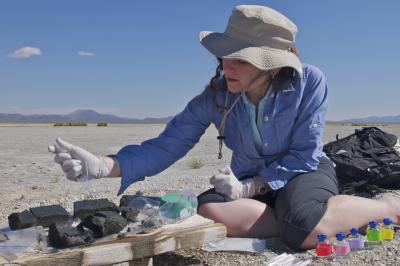Science is finally considering retracting a 2010 paper claiming the discovery of a bacterium that could substitute arsenic for phosphorus in its chemical makeup. “We feel the best thing to do would be to retract the paper,” the journal’s editor-in-chief Holden Thorp told the New York Times in an article published Tuesday.
The article follows up with Felisa Wolfe-Simon, the lead author of the work who withdrew from science and public life after the intense spotlight from the work’s initial splash led to damaging criticism. She has recently gone back to the lab and in 2024 received a NASA exobiology grant.
Retraction Watch readers may recall that Science published numerous technical comments and two studies refuting the original work. In 2012, David Sanders — who would later become well-known as a sleuth — said in our pages that the “only responsible action on the part of Science would be to retract the original article.” He called again for the retraction in 2021.
Also in 2012, we asked Science whether the journal had asked the authors if they wanted to retract the article. They told us at the time: “Except in rare cases, corrections, clarifications, or retractions should ideally be initiated by the original research authors.”
The New York Times article indicates the journal has had a change of heart. And yesterday Thorp linked to the article on his LinkedIn page, writing:
Science initially published a large set of technical comments and the two failed replications but did not retract the paper. That was consistent with the norms at the time. As this paper continues to be discussed prominently, Science is of the view that the paper should be retracted. We have not done so yet, because we are working with the authors to ensure that they have every opportunity to understand our position and to make any additional arguments.
Stay tuned.
Like Retraction Watch? You can make a tax-deductible contribution to support our work, follow us on X or Bluesky, like us on Facebook, follow us on LinkedIn, add us to your RSS reader, or subscribe to our daily digest. If you find a retraction that’s not in our database, you can let us know here. For comments or feedback, email us at [email protected].

Talk about a blast from the past. I thought this rubbish had been retracted years ago since I have never seen a paper discredited so quickly.
I’m astonished this wasn’t retracted years ago. This just compounds the failures of the “scientific enterprise” that were evident going back to the original NASA press conference. I remember watching that wondering how the managers allowed it to go on. Also, Science Magazine’s peer review (or lack thereof) sure didn’t do her any favors. And now, just as she’s trying to re-establish a research career, they reopen the wound that should have been treated and healed over a decade ago.
I may be useful to discuss here some of the things that were considered wrong with the original study, which led to the publication of “numerous technical comments.”
Forgive my poor memory, but I seem to recall something about not controlling for minuscule amounts of contaminating phosphate in the experiments, thereby leaving open the door to there being some ATP present, thus undermining the conclusion that the “life” was completely based on arsenic instead of phosphate.
Were there other problems that explained the lack of reproducibility?
it seems it was the tiny bit of phosphate. one of the response papers described the bug as being extremely resistant to arsenic and able to take up and use very small amounts of phosphate. so an interesting extremophile critter, just not a new form of life
Taken from RW article–https://retractionwatch.com/2021/01/21/why-one-biologist-says-its-not-too-late-to-retract-the-arsenic-life-paper/ “The article was accompanied online with a record eight Technical Comments criticizing nearly every aspect of the article. The authors’ response addressed practically none of the points of the commentators and introduced new distortions of the data in the article. Comparing the data for the phosphorus content of their media in the response (for example, 4/5/10 -As/–P medium, 3.7 ± 0.8 μM) to the data for the same medium in Supplementary Table 1 of the original article (3.7 ± 0.4 μM), it can be seen that the authors doubled the reported standard deviation in order to reach their conclusions. They also ignored the analysis of another “batch” of media reported in Supplementary Table 1 of the original article that contradicted the whole premise of the article.”
I remember this paper vividly. I was listed on Stanford University’s “Astrobiologist” list and spent much of the day fielding local questions and being on the web.
Steve Benner’s immediate response to the paper gave a clear call to be a heavy skeptic. It is obvious that the mechanisms to make more DNA in the cells and to read the DNA to make proteins have evolved over 4 billion years and have multiple complicated steps that make and use the usual kind of DNA that as phosphorus not the kind with arsenic. A lot of changes would be needed to use and make arsenic DNA. An analogy is that a nonstandardized part in a Chevy is unlikely to work in a Honda.
By mid-afternoon, Rosie Redfield had published her refutation. This is a clear example of how science self corrects. I see no need for retraction. The paper is honest but flawed science. (Although, the authors of the arsenic paper were not shy in front of TV cameras.) The term “arsenic fiasco” still refers to this paper.
Then the question arose on how this paper got published in the first place. There were people then with high-tech ways that would have quickly confirmed arsenic DNA if any was around. They would have stopped everything else here to help. They were not pleased.
Also